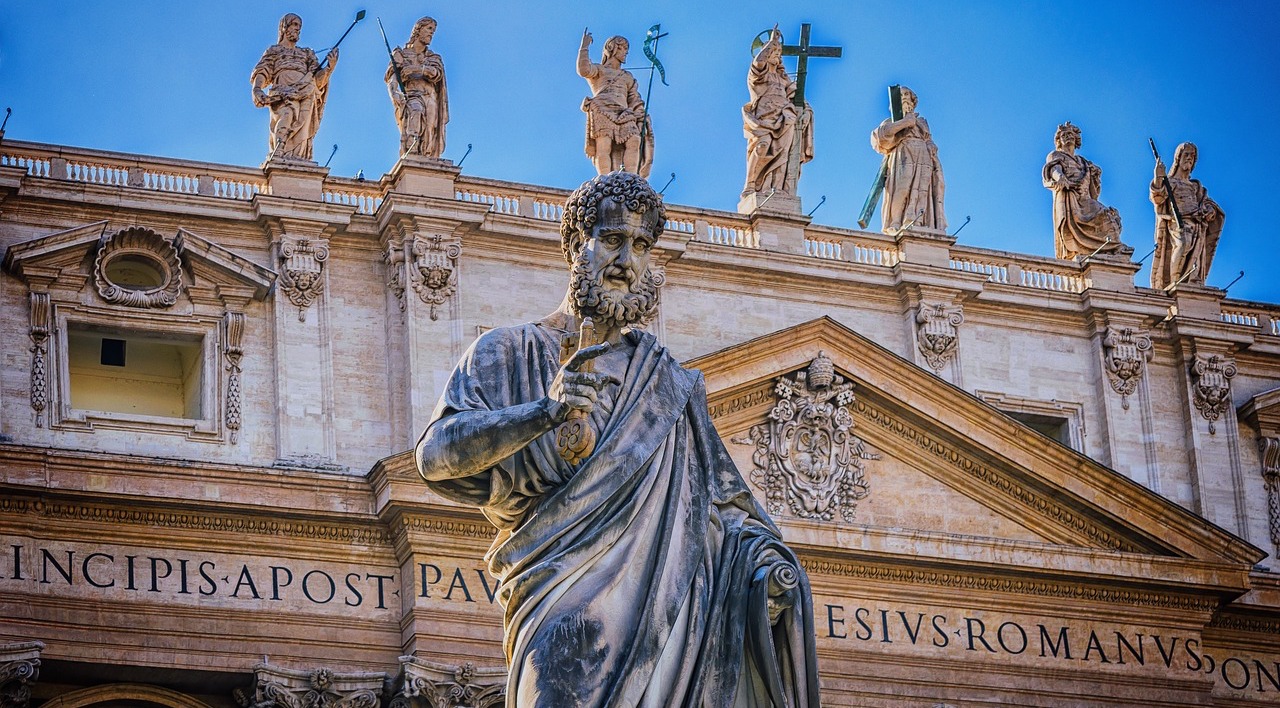Overview of the Book
The Epistles of First and Second Peter are placed under the category of general epistles1 because the general epistles were addressed to a wider body of Christian believers2 rather than to a specific person or group. Both these epistles are filled with practical guidelines for Christian living in the face of suffering due to faith in Jesus Christ (First Peter) and for warnings against the teachings of false prophets and teachers (Second Peter). Even in today’s context, Christian believers in many parts of the world face similar situations due to their faith in Jesus Christ.
The focal point of First Peter is Salvation through Faith (1 Peter 1:7, 9). The epistle admonishes its readers to live holy lives in this sinful world because God chose them to be His people and because Christ suffered and died for their sake. It also gives guidelines to keep their hope alive in anticipation of a better future. The epistle set forth guidelines on how to respond to the unjust persecution believers may face in their lives. Although the believers are labeled as strangers and aliens on earth, they have a living hope in Christ Jesus(1 Peter 1:1-12) and their identity is displayed as a chosen generation, a royal priesthood, a holy nation, a peculiar people (1 Peter 2:9).
Authorship
It is widely accepted among Bible scholars that First Peter was written by Peter, an apostle of Jesus Christ. The opening verse of First Peter states, “Peter, an apostle of Jesus Christ,” which matches with Apostle Peter.3 When Jesus first met Simon Peter, Jesus said to him, “You will be called Cephas” (Mark 1:16; John 1:40-42), which is translated to Peter, meaning ‘a rock.’ Simon Peter was a fisherman called by Jesus to be His follower and disciple. As arguably the most influential among the disciples of Jesus Christ, particularly among ‘The Twelve’4 (1 Peter 1:1a; 2 Peter 1:1), he was among those who delivered the first gospel message on the day of pentecost (Acts 1:9; 2:14-47). Although there are some arguments among the New Testament scholars regarding the Petrine authorship of First Peter, these scholars have come to the consensus that Apostle Peter wrote the epistle with the help of Silas who was, for Peter, a brother in Christ and a ministry companion (1 Peter 1:1a; 5:12). Peter testifies that Silas and Mark, another ministry companion and interpreter, were with them during this period of time (1 Peter 5:12-13).
Recipients of the Epistle
Peter addresses his letter to God’s elect who are scattered throughout the Roman Empire, particularly in the five provinces of the Northern Asia Minor, namely Pontus, Galatia, Cappadocia, Asia, and Bithynia (Peter 1:1). Perhaps some of these believers might have been present on the Day of Pentecost and believed in Jesus Christ after hearing Peter’s first gospel message (Acts 2:8-11). They might have been scattered throughout Asia Minor due to the persecution which started in Jerusalem after Stephen’s martyrdom (Acts 8:1; 11:19). These recipients are called and counted as aliens in this world, but Peter encourages them and addresses them as a chosen people, a royal priesthood, a holy nation, God’s special possession (1 Peter 2:9).
Date of Writing
Although, we do not have any strong evidence to support the exact date of writing, most bible scholars believe that the epistle was written well before the severe persecution which started under the Roman emperor Nero in AD 64. Thus, despite some disagreement, most Bible scholars believe that the epistle was written sometime between AD 60 and 63. During this period, according to 1 Peter 5:12-13, Peter, Silas, and Mark were together in one place, perhaps in Rome. Although, the place mentioned is “Babylon” in 1 Peter 5:13, most Bible scholars believe that the place of writing was Rome, since Rome was considered as the seat of ancient Babylon.
Purpose of Writing
The epistle is primarily written to encourage those believers who were facing persecution in the Roman provinces of Asia Minor (1 Peter 1:1; 4:12-16). For instance, the phrases that Peter uses are ‘various trials’ (1 Peter 1:6), ‘being tested by fire’ (1 Peter 1:7), maligned ‘as evildoers’ (1 Peter 2:12) and suffering ‘for doing good’ (1 Peter 3:17). Peter encourages the believers to be faithful to Jesus Christ, the Lord and Savior. He also reminds them that they are aliens and strangers in the world. As such, the people of this world might not be happy with them and, as a result, persecute them for no reason (1 Peter 2:11).
There are numerous other reasons for writing First Peter. The epistle is written to inform Christians everywhere to lead a life that is according to God’s will despite the situations they face during the course of their lives. In this particular case, the author instructs the believers to live a holy life pleasing to their heavenly Father and to remain faithful to God in the midst of their persecution. He reminds the believers that Jesus Christ also went through severe suffering for their sake (1 Peter 1:11). The book focuses on believers’ holy life because God is holy and He chose them to be His people (1 Peter 1:2a). The author identifies the believers as the living stones (Jesus being the Living Stone), the spiritual household of God, the chosen race, the holy and royal priesthood, the holy nation, and the people of God’s special possession (1 Peter 2:4-10). Finally, the book inspires all believers to live a life worthy of their call because those who live such a life will inherit a great reward in heaven (1 Peter 1:2-5). Many Christians who suffer due to their faith in Jesus Christ:
- identify themselves with Jesus Christ despite the suffering they go through
- glorify Christ in and through their lives despite the hardship they go through
- become strong in their faith in Jesus Christ as they overcome the trials and temptations they face in their lives
- prove themselves right with their righteous God when they stay strong in suffering
- please God the Father when they victoriously triumph over the momentary suffering
- submit themselves to fulfill the will of God in their lives despite unfavorable situations they encounter on their spiritual journey
Major Themes
There are so many themes one can extract from First Peter. These include the holiness of God, the royal priesthood, living hope, unending joy, obedience, submission, salvation, suffering of believers, sojourners, and the hostile world. Nonetheless, the one major theme present throughout the epistle is ‘suffering’ (ταλαιπωρία talaiporía). In other words, suffering, hardship, or tribulation due to one’s identity with Jesus Christ or one’s faith in Jesus Christ is the overarching theme in the epistle. First, Peter narrates Christ’s suffering for the salvation of mankind (1 Peter 2:21-24). Second, Peter addresses the suffering of believers to attain that salvation in their personal lives (1 Peter 3:8-22). Highlighting Christ’s suffering was inevitable in the epistle because, on one hand, Christ suffered as a substitute for sinful mankind (1 Peter 1:18-19; 2:24; 3: 18) and, on the other hand, He set an example through His suffering for believers to follow the path of redemption and attain it (1 Peter 2:21-24; 4:1,13-14). As Christ’s suffering, death, and resurrection brought new life to all those who believe in Him, they are called to live a life of love and holiness that is filled with the hope of future glory despite suffering (1 Peter 1:3; 13-25).
In light of the tremendous persecution that caused and would cause so much suffering for Christians in the first century and beyond, Apostle Peter reaffirms to Christians that patiently enduring the suffering would prove the genuineness of their faith in Jesus Christ (1 Peter 1:7). The genuineness of their faith in Jesus Christ would result in praise, glory, and honor when Jesus returns (1 Peter 1:7), and in turn, the praise, glory, and honor one receives from Jesus would result in their salvation (1 Peter 1:9). Thus, although believers were considered as alien and strangers on earth (1 Peter 2:11), they have an eternal home in Heaven. Peter also provides believers with instructions on how to respond to unjust persecution and suffering (1 Peter 4:12) by encouraging believers to follow Christ’s example of enduring suffering gently, innocently, and righteously.
General Outline
- Opening Greetings (1 Peter 1:1-2)
- The Relationship of Believers to their Lord and Savior (1 Peter 1:3 – 2:10)
- God’s Grace and salvation through faith (1 Peter 1:3-12)
- The heavenly calling and inheritance for believers in Jesus Christ (1 Peter 1:3-5)
- The test of believers’ faith and love, and their reward (1 Peter 1:6-12)
- Invitation to be Holy as God is Holy (1 Peter 1:13-2:3)
- Invitation to live a holy life despite the world (1 Peter 1:13-21)
- Believers’ spiritual growth by drinking the pure milk of the Word (1 Peter 2:1-3)
- Identity of believers in the Lord (1 Peter 2:4-10)
- Believers are being built in to a spiritual House (1 Peter 2:4-8)
- People belonging to God (1 Peter 2:9-10)
- God’s Grace and salvation through faith (1 Peter 1:3-12)
- The Relationship of Believers to the rest of the Community (1 Peter 2:11 – 3:12)
- Reminding the believers their identity: Strangers and Aliens in the world (1 Peter 2:11-12)
- Believers’ Call for submission (1 Peter 2:13-3:7)
- Submission to Rulers and the governmental authorities (1 Peter 2:13-17)
- Slaves and Masters attitude towards each other (1 Peter 2:18-20)
- Example of Christ’s submission and suffering (1 Peter 2:21-25)
- Household responsibilities (1 Peter 3:1-7)
- Wives’ attitude to their husband (1 Peter 3:1-6)
- Husbands’ duty to their wives (1 Peter 3:7)
- Believers’ call to act right (1 Peter 3:8-12)
- The Consequence of Believers’ identity and faith in Jesus Christ (1 Peter 3:13 – 4:19)
- Believers’ call to follow Christ’s example of suffering for doing Good (1 Peter 3:13-22)
- Believers’ call to follow Christ’s example until the end (1 Peter 4:1-11)
- Believers’ present painful trials and their Future glory (1 Peter 4:12-19)
- Peter’s Counsel to the Church Leaders and Believers (1 Peter 5:1-11)
- Counsel to the Elders (1 Peter 5:1-4)
- Counsel to the Young (1 Peter 5:5-11)
- Concluding Messages (1 Peter 5:12-14)
Inquisitive Talking Points
The epistle of First Peter provides an eternal perspective for believers’ earthly life.
- Believers are:
- A Holy Priesthood (1 Peter 2:5)
- A chosen generation, a royal priesthood, a holy nation, a peculiar people (1 Peter 2:9)
- Aliens and Strangers in this world (1 Peter 2:11)
- Believers know the truth that the end of all things is near (1 Peter 4:7):
- Christ’s imminent coming
- End of the world is near
- Peter reminds believers that in Christ Jesus:
- they are chosen and sanctified (1 Peter 1:1-2)
- they have a glorious calling and heavenly inheritance (1 Peter 1:2-5)
- their faith in Christ is subjected to testing and refining (1 Peter 1:6-7)
- their suffering will result in praise, glory, and honor at the coming of Christ (1 Peter 1:8-9)
- Salvation is available for both OT and NT saints (1 Peter 1:10-21)
- The need of having the pure milk of the Word (1 Peter 2:1-3)
- We are living stones being built into a spiritual house (1 Peter 2:4-10)
- We are aliens who are passing through the foreign land (1 Peter 2:11-12)
- We are called to live honorably and humbly in relation with others (1 Peter 2:13-3:12)
- We are called to submit and suffer for Christ’s sake (1 Peter 3:9-5:11)
- Know that your enemy is the Devil (1 Peter 5:8)
- Righteous suffering will bring God’s favor and reward for believers
Peter gives practical guidelines for the beginners in Christian suffering. Peter instruct the Christians how to respond to unjust persecution and suffering.
The key words to be noticed and studied are: Love, Grace, Hope, Joy, Salvation, Holiness, Humility, Fear, Obedience, Submission, Sanctification, and, above all, Fear of God.
There are certain experiences which are universal to all believers irrespective of who they were prior to their commitment to Christ. In most cases, almost every Christian of them will:
- face persecutions in life in one way or other from the unredeemed ones
- be able to forgive all those who harm or trouble them
- overcome all the obstacles they face in the course of life with the help of God
- be able to live a life of Holiness by the grace of God
- grow into Spiritual maturity
- experience God’s unfailing favor in all of life’s situations
However, one thing is certain that, regardless of what Christians go through in life, the called and redeemed ones will be the household of God forever.
A Strong Warning for Believers (1 Peter 5:8-9): “Be self-controlled and alert. Your enemy the devil prowls around like a roaring lion looking for someone to devour. Resist him, standing firm in the faith, because you know that the family of believers throughout the world is undergoing the same kind of sufferings.”
Elaboration (of the superscripts)
The term ‘Epistle’ is derived from the Greek word Epistole, which simply means letter or message. However, the New Testament epistles are not just letters that contains mere information, they contain teachable instructions for the Church. There are 21 epistles in the New Testament (Romans to Jude). All these epistles are written by either Apostles (Peter, John, and Paul) or Jesus’ brothers (James and Jude). Apostle Paul’s epistles were named after the recipients’ name or title, but the general epistles are known by their authors’ name.
“To God’s elect who are scattered throughout Pontus, Galatia, Cappadocia, Asia and Bithynia (Peter 1:1; also refer Acts 11:19).
A brief note on Apostle Peter: Simon Peter had a very interesting life story both before his call and after his call. It is worth knowing and learning about him. He, being a fisherman, must have been physically bold and strong but spiritually very poor and imperfect. Somewhere in the middle of his life, Jesus met him, called him, corrected him, trained him, and appointed him to be one of the leading torch bearers for the gospel work. While the gospels narrate how Jesus found him, Peter’s call and training for ministry, the early part of the book of Acts explains how God used him to begin and establish the New Testament Church on earth. Also, through his writings (the epistles of First Peter and Second Peter), he narrates what he learned and experienced from Jesus as a disciple. It is understood from the gospels that as he spent time with Jesus, he grew from the state of spiritual immaturity to spiritual maturity by reshaping his ordinary lifestyle into a meaningful and purposeful lifestyle. It is very interesting to know the fact that his lifestyle changed drastically from a fearful state to the state of courage and boldness – at the beginning of his call, Peter fell at Jesus’ knees and said, “Go away from me, Lord; I am a sinful man” (Luke 5:8), but at the end of his training, he said, “Lord, I am ready to go with you to prison and to death” (Luke 22:33). Peter’s call and appointment by God, his firm belief and trust in Jesus Christ, and his continued dependance on the Holy Spirit enabled him to stay focused and to serve his Master and Lord faithfully until the end of his life on earth. Apostle Peter was truly one of the mightily used apostles of Jesus (Acts 1-12; 2 Peter 1:14).
The names of the twelve disciples Jesus are mentioned in Matthew 10:2-4, Mark 3:16-19, and Luke 6:12-16. They are: Simon Peter, James, John, Andrew, Philip, Bartholomew, Matthew, Thomas, James the son of Alphaeus, Judas (Thaddaeus) the son of James, Simon the Zealot, and Judas Iscariot.




